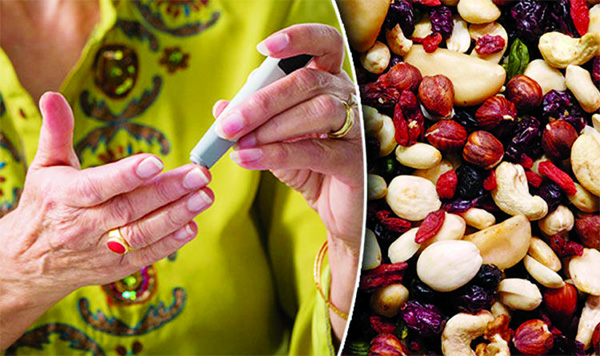
Weekend Plus Desk :
hile nuts are often considered the healthiest snack to munch on and are packed with a number of health benefits, a recent study from Iran has noted that nut consumption might increase blood sugar levels in diabetics. However, nuts were found to lower the risk of obesity.
In terms of dietary composition, nuts are high in monounsaturated fatty acids (MUFA) and polyunsaturated fatty acids (PUFA), and are good sources of vegetable protein.
“Nuts incorporation into people’s usual diet may have beneficial effects for individuals with lower risk, such as non-diabetic subjects,” the authors stated in the journal Nutrition, Metabolism and Cardiovascular Diseases.
The study, titled ‘Long term association of nut consumption and cardiometabolic risk factors’, involved analysis of 1,387 healthy participants within the framework of the prospective cohort of Isfahan Cohort Study for a period of 12 years. A validated food frequency questionnaire was completed and anthropometric measurements (assessing size, shape and composition of the human body), blood pressure, and fasting serum lipids and blood sugar were evaluated in three phases.
Based on the turtle of nuts consumption, cut-points and associations were evaluated between the thirds of nut intake. Compared with those in the first third, subjects in the last third were less likely to have hypercholesterolemia, hypertriglyceridemia, and obesity, but more likely to have diabetes. ‘A greater intake of nuts was associated with a lower risk of dyslipidemia in the crude model’.
“After adjustment for potential confounders, an inverse association for nut consumption and obesity, but the positive association for diabetes and nut intake was observed,” concluded the authors.
Previously, based on NHS or the Nurses’ Health Study which has been continuing in regular phases since 1976 in the United States, a 2002-study ‘Nut and Peanut Butter Consumption and Risk of Type 2 Diabetes in Women’, was conducted by evaluating 83,818 women from 11 states as per the NHS-evaluated women aged 34 to 59 years who had no history of diabetes, cardiovascular disease, or cancer. The study completed a validated dietary questionnaire at baseline in 1980 which was followed up for 16 years.
The authors of the study showed that nut consumption was associated with a 29 per cent decreased risk of incident diabetes mellitus. In women, a 45 per cent risk reduction was seen in those with BMI of less than 25 kg/m2, who consumed nuts five times per week.
Residual confounding by body weight was considered as a major concern by the authors. In a similar study in the male population, ‘Nut Consumption and Risk of Type 2 Diabetes in the Physicians’ Health Study’, nut consumption was not associated with incident diabetes mellitus in apparently healthy US male physicians.
hile nuts are often considered the healthiest snack to munch on and are packed with a number of health benefits, a recent study from Iran has noted that nut consumption might increase blood sugar levels in diabetics. However, nuts were found to lower the risk of obesity.
In terms of dietary composition, nuts are high in monounsaturated fatty acids (MUFA) and polyunsaturated fatty acids (PUFA), and are good sources of vegetable protein.
“Nuts incorporation into people’s usual diet may have beneficial effects for individuals with lower risk, such as non-diabetic subjects,” the authors stated in the journal Nutrition, Metabolism and Cardiovascular Diseases.
The study, titled ‘Long term association of nut consumption and cardiometabolic risk factors’, involved analysis of 1,387 healthy participants within the framework of the prospective cohort of Isfahan Cohort Study for a period of 12 years. A validated food frequency questionnaire was completed and anthropometric measurements (assessing size, shape and composition of the human body), blood pressure, and fasting serum lipids and blood sugar were evaluated in three phases.
Based on the turtle of nuts consumption, cut-points and associations were evaluated between the thirds of nut intake. Compared with those in the first third, subjects in the last third were less likely to have hypercholesterolemia, hypertriglyceridemia, and obesity, but more likely to have diabetes. ‘A greater intake of nuts was associated with a lower risk of dyslipidemia in the crude model’.
“After adjustment for potential confounders, an inverse association for nut consumption and obesity, but the positive association for diabetes and nut intake was observed,” concluded the authors.
Previously, based on NHS or the Nurses’ Health Study which has been continuing in regular phases since 1976 in the United States, a 2002-study ‘Nut and Peanut Butter Consumption and Risk of Type 2 Diabetes in Women’, was conducted by evaluating 83,818 women from 11 states as per the NHS-evaluated women aged 34 to 59 years who had no history of diabetes, cardiovascular disease, or cancer. The study completed a validated dietary questionnaire at baseline in 1980 which was followed up for 16 years.
The authors of the study showed that nut consumption was associated with a 29 per cent decreased risk of incident diabetes mellitus. In women, a 45 per cent risk reduction was seen in those with BMI of less than 25 kg/m2, who consumed nuts five times per week.
Residual confounding by body weight was considered as a major concern by the authors. In a similar study in the male population, ‘Nut Consumption and Risk of Type 2 Diabetes in the Physicians’ Health Study’, nut consumption was not associated with incident diabetes mellitus in apparently healthy US male physicians.

